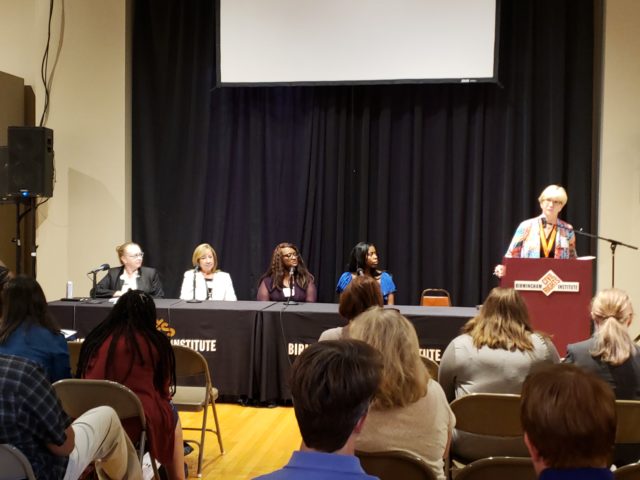
By Ariel Worthy
The Birmingham Times
Human Trafficking was the focus at the Birmingham Civil Rights Institute’s (BCRI) and Federal Bureau of Investigation’s (FBI) 13th annual joint conference held this week.
During one panel discussion AngelaMarie Pacley, co-founder of Fashion4Life, a nonprofit that uses fashion to raise awareness of human trafficking, shared her story of daughter, Sade.
“My daughter was kidnapped in Atlanta at the age of 16,” Pacley said. “That was over 11 years ago before this topic actually became a big deal. So, we went through a series of trauma.”
Pacley said Sade was a chronic runaway. “She went through that teenage stage where she thought she was my mom so we had a lot of confrontations,” Pacley told the audience at the BCRI. “I would tell her all the time ‘you’re going to run away and one day something bad is going to happen to you.’ Unfortunately those words came ringing home. She went missing in 2006.
Pacley, from Atlanta, said she worked with police to find her daughter.
“I just could not sit back and allow them to say ‘well we’ll get back with you’ . . . it’s going to take a village, it’s going to take everyone involved,” she said. “You can’t just file a report and expect the police to do everything so I was willing to work very closely with the police department. I was willing to do undercover stings, I was willing to be an undercover prostitute.”
After nearly six months, Sade was found.
“She called me from a phone number and I’m asking her, ‘where are you?’ . . . and I didn’t get enough information. I called that number back and the lady said she just let Sade borrow her phone . . . I called that number back and come to find out the lady said ‘I’m so sorry I lied to you. I was one of the girls holding her … I’ve been praying that you’d call me back. I owe you and I’ve been keeping my ear to the streets. They’re going to sell her and a group of girls to a trafficker in New York.’
“That’s where I was able to call the police and tell the whole thing. They had the helicopters and they were able to bust … those traffickers.”
Pacley was part of a panel discussion in a session titled “Rescue and Recovery.” She was joined by Jan Bell, Children’s Policy Council; Keba Green, who works with part of Fashion4Life; Carolyn Potter, Executive Director of The WellHouse; and Dr. Melissa Peters, medical director of Children’s of Alabama.
Pacley said her daughter was rescued with 12 other girls who were reunited with their mothers, the youngest being 10 years old. Sade is now 29, has two kids and speaks out against human trafficking, Pacley said.
The “Not Right” Meter
Peters said it’s important for people to tap into their “not right” meter.
“You have a ‘not right meter’ in your brain that picks up when something just isn’t right,” Peters said. “Part of our training is to help doctors hone that ‘not right’ meter. It is so easy to miss something right in front of you . . . part of it is diagnostic error.”
Trafficked victims do not have a set look, she said. An important note is that males are trafficked and so are Lesbian, Gay, Bisexual, Transgender and Queer or Questioning (LGBTQ) youth.
“It’s harder to count (male victims) because they are less likely to disclose that they had been trafficked,” she said. “There are a lot of female traffickers. The age of a person, you might not think of a 10 year old being trafficked. That totally happens.”
The problem is easy to miss, she said. The media can skew the image of who a trafficking victim is, she said. “We didn’t call it human trafficking; we called it child abuse 15 years ago,” she said. “We’ve had kids come in because their family was selling them. But we can see with new eyes now. We can pay attention to those tiny signals that can tell you that something is going on.”
Peters also added that there is no expectation for medical providers to expect victims to speak up.
“We don’t know what’s going on,” Peters said. “I involve other agencies if needed but we’re often not clear on if it was trafficking. What I am clear on is that they deserve to be loved, not to live in fear, they deserve kindness. Sometimes that’s the most powerful tool I have is to be kind.”
The conference began on Sunday, Sept. 16 at the Sixteenth Street Baptist Church where the public had an opportunity to be a part of the discussion on labor and sex trafficking along with a tour of the BCRI facility. The tour included the photography exhibit “Foot Soldiers: Profiles in Courage: Then and Now” by Chester Higgins.
The conference came on the weekend of the 55th commemoration of the day the Sixteenth Street Baptist Church was bombed on Sept. 15, 1963.



